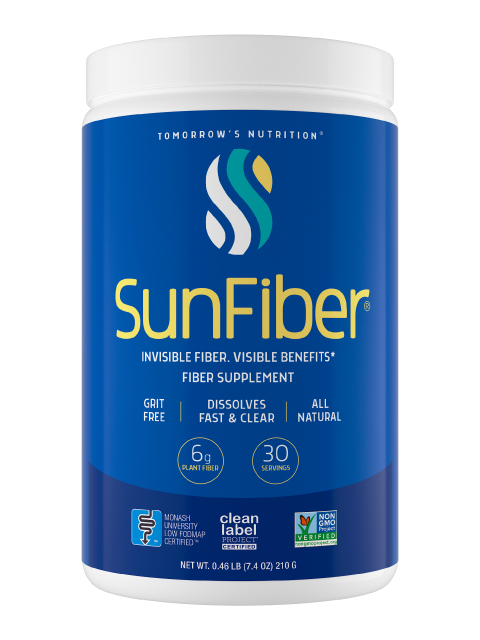Sunfiber partially hydrolyzed guar gum (PHGG) received a significant amount of attention this week during Digestive Disease Week 2014, which was held in Chicago. Dr. Yuji Naito, a professor from Kyoto Prefectural University of Medicine, presented their results of five studies, adding to the growing body of evidence demonstrating how Sunfiber benefits gut health.
The studies were:
1. Partially hydrolyzed guar gum (PHGG), a water-soluble dietary fiber, improves corticotropin-releasing hormone (CRH)-induced intestinal dysmotility in rats.
This research builds on previous studies related to Sunfiber and irritable bowel syndrome. Studies have previously shown that Sunfiber, a water-soluble dietary fiber produced by guar beans, improves diarrhea and constipation.
2. Partially hydrolyzed guar gum suppressed acetyl salicylic acid-increased permeability of small intestinal epithelial cells.
This research looked at the ability of Sunfiber to suppress acetyl salicyclic acid (aspirin) damage to epithelial cells within the small intestine. Researchers concluded that Sunfiber may help to decrease injury by using protein modulation.
3. Partially Hydrolyzed Guar Gum (PHGG) attenuates nonalcoholic steatohepatitis (NASH) in mice through the gut-liver axis.
It has been shown that prebiotics such as those found in Sunfiber reduce nonalcoholic fatty liver disease and hepatic inflammation, which is closely associated with intestinal inflammation. With this study, researchers wanted to investigate Sunfiber’s potential effectiveness on nonalcoholic steatohepatitis (NASH). They found indications that Sunfiber prevents the initiation of NASH in mice, partially through modulation in gut microbiota and increase in butyrate in intestine. They further concluded that Sunfiber may be a candidate of treatment for NASH.
4. Activation of Rho by partially hydrolyzed guar gum (PHGG), a water-soluble dietary fiber enhances colonic epithelial restitution.
Mucosal healing of colonic epithelium, by activation of RhoA, has been reported to be important to control inflammatory bowel disease (IBD). Because Sunfiber has been shown to help regulate colonic inflammation, researchers investigated its role in enhancing epithelial cell restitution via RhoA activation. They concluded that Sunfiber and its acetate metabolite, enhanced colonic epithelial cell restitution via activation of Rho kinase. “From these results, we determined the therapeutic potential of PHGG against the disease state of colonic mucosal damage such as IBD,” they concluded.
5. Partially hydrolyzed guar gum (PHGG) inhibited trinitrobenzene sulfonic acid (TNBS)-induced colonic damage in mice.
The aim of this study was to investigate Sunfiber’s beneficial effects on colonic mucosal damage induced by murine trinitrobenzene sulfonic acid (TNBS), a model resembling Crohn’s Disease. The results suggest that regular ingestion of Sunfiber prevents the development of TNBS-induced colitis in mice in part through the modulation of intestinal microbiota and short-chain fatty acids.
“Sunfiber PHGG’s benefits as a prebiotic appear to be far-reaching,” said Scott Smith, Vice President of Taiyo International. “These studies provide a promising and solid foundation for this area of research. We look forward to follow-up studies, as the trend for Americans and their healthcare practitioners appears to be toward integrative care: using natural solutions either alone, or in conjunction with pharmaceutical options, to support better health.”



is this product for sale in Europe?